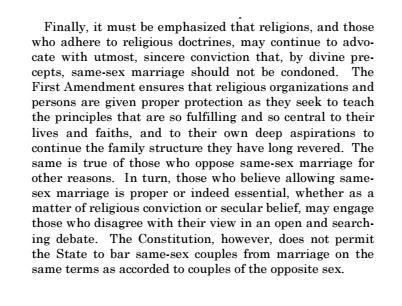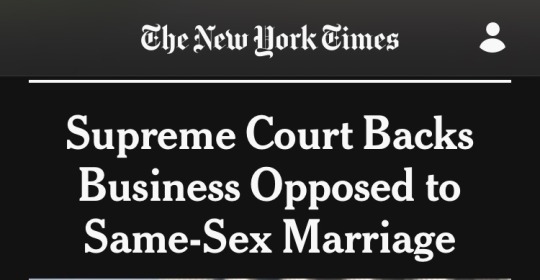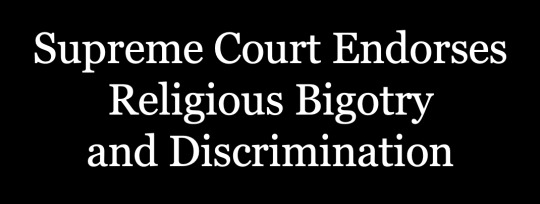#religious liberty
Text
In the Image of God
A recent study found that Jews are the demographic group most accepting of trans individuals in the United States.
When certain Christians assert a religious freedom right to discriminate against trans individuals -- particularly, a right to misgender them -- their argument typically proceeds something along these lines:
1. They believe every individual is created in the image of God.
2. Part of that image is the person's sex (and by extension, gender).
3. In particular, a person's sex/gender is inalterably assigned by God from conception.
4. They are forbidden from lying or falsifying God's choice.
Therefore, they say, they are religiously obligated to refer to people by their chromosomal sex, regardless of how they identify or publicly present. This religious duty, in turn, is used to press against rules and policies which require respectful treatment of trans individuals (including refraining from deliberately misgendering them, deadnaming them, and so on).
What's interesting about this framework is that a lot of it actually resonates with how I view the relationship of my Jewish faith and trans individuals -- with some crucial alterations. To wit:
1. I believe every individual is create in the image of God.
2. Part of that image is the person's sex (and by extension, gender).
4. I am forbidden from lying or falsifying God's choice.
The major distinction, of course, comes in prong 3:
3. A person's sex/gender is not necessarily or inalterably assigned by God from conception, but rather can be part of a person's own process of discovering who they are. Where such self-discovery leads to a person to conclude they are trans, non-binary, or any other identity that departs from the sex they were assigned at birth, they are not deviating from God's plan. They are uncovering their authentic self as God has created them.
The result of this process is part of God's image. Those who refuse to accept it are not cleaving to God's image, they are rejecting it.
God's process of creation is not, in my understanding of Judaism, a set-and-forget sort of deal. It is not a matter of passively being puppeteered by a divine hand. It something we do together -- we are partners in creation. To deny the results of that partnership is, for me, a denial of God's plan and practice just as much as it is for adherents of other religious views who adhere to a more static and calcified notion of the role of the divine.
And so for me, and I suspect for many Jews, the religious freedom obligation pushes in the other direction. Many conservative states have, or are considering, laws which require (at least in certain contexts) non-recognition of trans identity. For Jews (and others) who share my religious precepts, these laws would force me to deny -- to bear false witness to -- a key attribute of how God created some of my peers. I do not believe -- and this is a deep, fundamental commitment -- that God's "image" of trans persons was for them to be locked in a body or sex or gender identity that clearly is not authentically theirs. When they find their full self, they are equally finding God's image of themselves.
Consistent with my lengthily expressed feelings on the subject, I suspect that what's good for the goose will not be good for the gander. Despite the clear parallel, liberal Jews who assert religious liberty rights to be exempted from laws seeking to enforce by state mandate a transphobic agenda will not meet with the same success enjoyed by their Christian peers.
Nonetheless, there is value in promoting this sort of framework, and in unashamedly asserting Jewish independence from hegemonic conservative Christian notions of true religiosity. It is not woven into "religion" that God's image requires rejection of trans individuals' full selves. That is a choice, an interpretation of some religions or of some who call themselves religious. Other religions, other religious persons, have a different interpretation of how to respect and dignify the facet of God that is in every one of us.
via The Debate Link https://ift.tt/vlsH4T2
3K notes
·
View notes
Text
This week, Supreme Court Justice Samuel "goes on expensive fishing trips with republican megadonors" Alito decided to use an official Supreme Court order to once again rail against same-sex marriage and the entire concept of safeguarding queer rights.
It was all in response to a case the Supreme Court declined to hear involving the dismissal of 3 potential jurors who claimed that they had been unfairly passed over (yes they're complaining about not being selected for jury duty) due to their religious beliefs. The case involved a woman who was suing her employer for sexual discrimination and retaliation after she started dating the ex-girlfriend of a male coworker. The 3 potential jurors that had not been selected had stated a belief to the court that homosexuality is a sin.
Rather than commenting on the obvious bias three potential jurors had against a party in the case, Alito instead spent five pages ranting about the sheer injustice that had been done to them. The case, he said, fully exemplified the "danger" that he'd predicted back in 2015, when the Supreme Court had legalized same sex marriage nationwide (in a slim 5-4 vote, I will remind):
"Namely, that Americans who do not hide their adherence to traditional religious beliefs about homo-sexual conduct will be labeled as bigots and treated as such by the government."
Again this was a case in which a court ultimately decided that maybe people who believed that homosexuals were sinful shouldn't sit on a case in which one of the parties was one such "sinner." That sounds pretty fair to me; they didn't call them bigots, or evil, or throw them in jail. The court just decided that maybe they weren't a good fit for that particular case. For that particular plaintiff.
But no, a Supreme Court Justice, someone who is supposed to be a scholar of law, turned it in his mind into a government assault against "people of good will."
Never forget how narrow that marriage equality decision had been. Never forget Alito and Thomas are still salty about it 9 years later and have stated in public multiple times they want to revisit this decision. Just like Roe, just like Miranda Rights, just like the Voting Rights Act - they will gut civil rights and established precedent on the altar of their Originalism and make us beholden to the tenets of their personal Gods.
And they're doing it in public too, so they can signal to everyone who thinks like them to keep trying, you have friends here. You have a sure chance of victory.
At the very least, the lesbian with mad game won her case.
#Samuel Alito is still an Originalist Piece of Shit#Supreme Court#US Supreme Court#Homophobia#Religious Liberty#is just just draping your beliefs with a cloak of righteousness#where are court cases against cities that make it illegal to feed the hungry and homeless?#where are the court cases against Texas or Florida about the dignity of refugees?#why does ''Religious Liberty'' always mean ''My right to treat people like Less Because God Says So''#and nothing about values Jesus actually talked about?#all they want the law to do is protect themselves and THEIR interests - and bind everyone else#Christian Nationalism#Originalism
218 notes
·
View notes
Text
On Thursday, Justice Neil Gorsuch released a 26-page opinion venting outrage about a legal dispute that does not exist, involving websites that do not exist. Yet this case, built on imaginary grounds, will have very real consequences for LGBTQ consumers, and for anti-discrimination laws more broadly. All of the Court’s Republican appointees joined Gorsuch’s opinion in 303 Creative v. Elenis.
That said, the fake dispute that Gorsuch imagines in his 303 Creative opinion involves a reasonably narrow legal question.
In the past, Christian right advocates have sought sweeping exemptions from state and federal civil rights laws, rooted in their expansive notion of “religious liberty.” Often, these lawsuits claimed that the Constitution’s safeguards for people of faith allow anyone who objects to LGBTQ people on religious grounds to defy any law prohibiting anti-LGBTQ discrimination.
303 Creative involves a much narrower dispute. The case centers on Lorie Smith, a website designer who wishes to expand her business into designing wedding websites — something she has never done before. She says she’s reluctant to do so, however, because she fears that if she designs such a website for an opposite-sex couple, Colorado’s anti-discrimination law will compel her to also design wedding websites for same-sex couples. And Smith objects to same-sex marriages.
As Gorsuch summarizes her claim, Smith “worries that, if she [starts designing wedding websites,] Colorado will force her to express views with which she disagrees.”
This is not a religious liberty claim, it is a free speech claim, rooted in well-established law, which says that the First Amendment forbids the government from compelling people to say something that they would rather not say. In ruling in Smith’s favor, the Court does not say that any religious conservative can defy any anti-discrimination law. It simply holds that someone like Smith, who publishes words for a living, may refuse to say something they don’t want to say.
The full implications of Gorsuch’s opinion are not entirely clear. In the past, religious conservatives have argued that artists and artisans of all kinds — including bakers, photographers, and floral arrangement designers — should also be allowed to discriminate under the First Amendment, because all artistic work necessarily entails some kind of expression. Gorsuch punts on this question, writing that “hypotheticals about photographers, stationers, and others, asking if they too provide expressive services covered by the First Amendment,” are not present in the 303 Creative case.
And it is worth emphasizing that the particular kind of work that Smith does, writing words on a publicly available website, fits more snugly within the First Amendment than a similar claim brought by a wedding cake designer or a florist.
Before this case was argued, I wrote that if Lorie Smith had been approached by a same-sex couple and refused to design a wedding website for them, and if she had then been sued for refusing to do so, then she would have a very strong First Amendment defense against such a suit. As the Supreme Court said in Rumsfeld v. Forum for Academic and Institutional Rights (2006), “freedom of speech prohibits the government from telling people what they must say.” And that includes the right of a web designer to refuse to write words on a website that they do not wish to write.
But none of these events have actually happened. And, for that reason, the Supreme Court should have dismissed the case.
THIS CASE SHOULD HAVE NEVER MADE IT THIS FAR
The frustrating thing about this case is that it involves an entirely fabricated legal dispute. Again, Lorie Smith has never actually made a wedding website for a paying customer. Nor has Colorado ever attempted to enforce its civil rights law against Ms. Smith. Indeed, in its brief to the Supreme Court, Colorado expressed doubt that its anti-discrimination law would even apply to Smith.
Yet Gorsuch’s majority opinion repeatedly paints Smith as a hapless victim, oppressed by wicked state officials who insist that she must proclaim a dogma that she denies. As he writes in the very first paragraph of his opinion, “Colorado does not just seek to ensure the sale of goods or services on equal terms. It seeks to use its law to compel an individual to create speech she does not believe.”
This claim is simply untrue. Colorado has not brought any enforcement action against Smith, or taken any other step to compel her to say anything at all — or to design any website that she does not want to design. Nor has anyone ever sued Smith for allegedly violating Colorado’s anti-discrimination law.
Indeed, in one particularly amusing turn, Smith alleged during an early stage of this litigation that she was approached by a man about doing some design work for his wedding to another man. Yet, after the New Republic’s Melissa Gira Grant contacted this man, she learned that he never reached out to Smith — and that he was married to a woman.
These facts matter because federal courts, including the Supreme Court, do not have jurisdiction to decide hypothetical cases. As a unanimous Supreme Court held in Texas v. United States (1998), “a claim is not ripe for adjudication if it rests upon ‘contingent future events that may not occur as anticipated, or indeed may not occur at all.’” So the Court should have told Smith to go away and come back when she had a real dispute with the state of Colorado.
303 Creative, moreover, is the second time Gorsuch has taken such liberties with the truth in order to rule in favor of a religious conservative. Almost exactly one year ago, Gorsuch handed down the Court’s decision in Kennedy v. Bremerton School District (2022), a case about a public school football coach who, after games, would walk to the center of the 50-yard line and ostentatiously kneel down and pray before students and spectators — often while surrounded by players, community members, and even members of the press.
Indeed, in her dissent in Bremerton, Justice Sonia Sotomayor included a photo of Coach Kennedy holding such a prayer session, as a throng of uniformed football players and other individuals kneel with him, and as people holding video cameras look on.
And yet, Gorsuch’s opinion in Bremerton claimed that Kennedy merely wanted to offer a “short, private, personal prayer,” and then Gorsuch ruled in favor of Kennedy based on this fabricated version of Kennedy’s actual conduct.
Needless to say, this is aberrant behavior by a Supreme Court Justice — and really by six Supreme Court justices, since all of the Court’s Republican appointees joined Gorsuch’s decisions in 303 Creative and Kennedy.
#us politics#news#vox#2023#us supreme court#SCOTUS#303 Creative v. Elenis#republicans#conservatives#justice neil gorsuch#religious liberty#republican homophobia#anti lgbtq discrimination#lgbtqia+ rights#lgbtqia+#Lorie Smith#Rumsfeld v. Forum for Academic and Institutional Rights#Texas v. United States#Kennedy v. Bremerton School District#justice sonia sotomayor
152 notes
·
View notes
Text

Light the signal
🔥🔥🔥
[Tweet]
#The Satanic Temple#The Satanic Temple cannot help you get an abortion#abortion#abortion rights#abortion ban#imani gandy#religious rights#religious liberty
2K notes
·
View notes
Text
U.S. District Judge Roger Benitez issued a preliminary injunction to provide protection to these high school teachers who challenged the San Diego County Escondido Unified School District’s (USD) policy. The teachers argued that the policy infringed on their First Amendment rights of free speech and free exercise of religion, and that to violate it and be dishonest with parents would go against their genuine religious beliefs...
#Your Daily Inspiration#morning headlines#Christian News#Bibliatodo (English)#United States#Christian teachers#gender identity#students#San Diego County#California#Escondido Unified School District#religious liberty
23 notes
·
View notes
Text
Pray for this woman's father, who has been disappeared by Hamas for refusing to use his pulpit as an imam in war-torn Gaza for propaganda.
10 notes
·
View notes
Text
Hamas is not the Palestinian people. Hamas is a terrorist organization that came to power in Gaza in 2006.
For the Christian
youtube
Johnnie Moore's International religious liberty bio from Wikipedia:
China:
Moore condemned China’s treatment of Muslims in 2017 and wrote an open letter to the Chinese premier alongside of Rabbi Abraham Cooper from the Simon Wiesenthal Center.[8] In May 2021, the People's Republic of China issued retaliatory sanctions against Moore that banned him from entering the territory that it controls the United States issued sanctions against a Chinese official for the official's involvement in the detention of Falun Gong pratcitioners.[9][10][11]
Middle East:
In 2017 Moore joined the Los Angeles Museum of Tolerance Press Conference calling for tolerance and the end of bigotry.[12][13] Moore played a key role in the release of the historic Bahrain Declaration calling for rights for religious minorities in the Middle East. Days after the move of the Jerusalem embassy more led a multi-faith peace delegation from the Kingdom of Bahrain on a pilgrimage in Jerusalem.[13] Moore’s Bahraini trip to Jerusalem prompted his being listed on the electronic intifada for allegedly forging and alliance between Bahrain and Israel in defiance of the Arab boycotts of Israel.[14][15]
Moore met and raised awareness of human rights issues with the Saudi CP within weeks of the death of Khashoggi.[16] He also visited the country on 9/11 and is an advocate of the Crown Prince’s Vision 2030 reform agenda.[17] Moore participated in the announcement of the first ever Chief Rabbi for the United Arab Emirates[18] and held meetings with heads of state throughout the Islamic world with the Crown Prince of the United Arab Emirates in 2018[19] as well as advocating for persecuted Hindus in India.[20] He now serves on the ADL Task Force for Protecting Minority Groups in the Middle East.[21]
Moore praised the Kingdom of Jordan for its interfaith efforts[22] as well as praising the President of Azerbijain as a model of peaceful coexistence.[23] He has also met with Israeli Prime Minister Benjamin Netanyahu and various Palestinian leaders,[24] the President of Azerbaijan,[25][26] and twice with the Crown Prince of the Kingdom of Saudi Arabia in 2019 and 2018[27][28] and he has met with the World Council of Churches.[29]
Moore referred to the ISIS threat against Christians in Iraq and Syria as a “once in a 1000 year threat to Christianity.”[30] He chartered a private jet and organized the evacuation and resettlement of ISIS victims from Northern Iraq to Slovakia over Christmas in 2015, a first in a series of efforts that eventually resettled over 10,000 Christian and Yazidi refugees displaced by ISIS.[31][32] On September 11, 2019 he joined forces with Muhammad Alissa of the Muslim World League to issue a joint statement calling for cooperation between evangelicals like Moore and Muslims with a focus on protecting Christian holy sites.[33] Moore is a critic of Iran and has called for the Iranian people to take back their religion from their supreme leader.[34][35] He praised Pakistan’s prime minister for the arrest of a leading terrorist[20] and in 2019 his advocacy was credited for the release of an 82-year-old Muslim prisoner of conscience in Pakistan, Abdul Shakoor.[36][37]
Moore was among an evangelical delegation who met with Egyptian government officials[38][39] and was the guest of Egypt’s president for the grand opening of the Middle East’s largest cathedral.[40]
North Korea:
Moore was involved in bringing together liberal, moderate and conservative evangelicals in a joint call for prayer for peace in North Korea.
Terrorism Primer
youtube

Peace Process Primer
youtube
youtube
#terrorism#hamas#israel#heartbreaking 💔#evil#pray for the peace of jerusalem#open borders#religious liberty#soros#Youtube
6 notes
·
View notes
Text


Did you know that Giving Tuesday is a holiday where you can give back to your favorite organizations to help fulfill their missions of bettering this world? This year, we’d like you to consider Better Future Program (BFP) for your donations! Founded in 2016 by Reagan Peters-Roussell, BFP is a 501(c)(3) youth-run nonprofit headquartered in Bulbancha, also known as New Orleans, Louisiana. Our mission is to build a better and brighter global future for marginalized youth through education, awareness, and unity!
To fulfill this mission, with the help of over 70 registered volunteers as well as over 1,300 supporters globally from Brazil to Malaysia, BFP offers 3,000+ free social justice, mental health, and academic resources to the public! With your donations, we can host annual educational book drives, continue expanding our mutual aid network (ex. our gender-affirming binder drive in May), create paid internships for marginalized youth, and expand our regional chapters 👀
Link to donate here! ACLU article on supporting grassroots leaders linked here!
#reaux speaks#black lives matter#anti capitalism#abolition#intersectionality#educational equity#anti racism#religious liberty#disability justice#mad liberation#climate change#decolonization#gender equity#queer#trans#bodily autonomy#anarchism#donation#donations#mutual aid#giving tuesday#black liberation
22 notes
·
View notes
Text
Am I Nuts for Thinking a Jewish Florist Should Have To Make an Easter Arrangement?
One thing I tried to impress upon my Con Law students this semester (and every semester) is that the interplay between anti-discrimination law and freedom of speech (and freedom of religion) is complicated and raises a host of thorny questions that defy easy resolution. These issues, of course, lie at the forefront of the 303 Creative case currently before the Supreme Court, which I'm sure will address them with the care, nuance, and sensitivity they deserve [/sarcasm].
But on that matter, I want to flag a hypothetical offered by prominent First Amendment specialist and former federal judge Michael McConnell, to get folks' intuitions on:
What if a Jewish florist is asked to design the floral display of white lilies on Easter Sunday morning at a Christian church? Ordinarily, flowers are just flowers. But the lilies in church on Easter morning are a symbol of the new life in Christ. I cannot believe that a free nation would compel a Jewish florist to construct a symbol of Christ's resurrection—on pain of losing the right to be a florist.
McConnell frames this as his "personal favorite hypothetical", and clearly perceives it as a knockout argument for the pro-free speech/religious liberty side. But perhaps I'm not fully grasping the facts, because speaking as a Jew this prospect doesn't seem that frightening to me.
Suppose I'm a Jewish florist. A customer comes in and says "I've seen the lovely work you've done with white lilies, could you please make a similar display for me?" I agree, since I have loads of experience working with white lilies. The customer then says, "thanks -- we plan on putting this display up in our church on Easter morning!" This prospect ... doesn't upset me. I don't intuitively think I should be able to refuse the customer, notwithstanding the fact that I obviously don't believe in the divinity of Christ, and I don't view continuing to serve the customer as forcing me to avow any beliefs I don't hold.
At root, the reason why this prospect isn't bothersome is because I don't view my customer's use of my flowers as representing my speech. I just design the flowers; what they do with it is their business. If someone sees the arrangement at church and learns that David's Flowers created it, I do not expect them to think "wow, I had no idea David believed in Christ's divinity!" This isn't to say I have no free speech concerns regarding flower arrangements -- I would very much chafe at government regulations that, for example, regulate what shapes I can use in my designs. That part very much is my expression, would be attributed to me -- the churchgoer who compliments the pattern of the flowers would credit those decisions to David's Flowers (I wrote about this a few years ago as the problem of partially expressive conduct).
There are still plenty of tough cases at the margins. I show my customer a preliminary design; they twist their lip and say "I dunno ... it's just not capturing the majesty of Christ's resurrection, you know?" I'm at a loss ("So ... bigger?"). But I'm inclined to think that while such an example might demonstrate why I might be a bad choice to design the arrangement, it doesn't give me the right to discriminate against the customer if they are in fact thrilled with the work I do and have done for other customers.
For me, then, McConnell's hypothetical has the opposite effect than what he intended. And of course, for many Jews -- particularly Jews who live in predominantly non-Jewish areas -- the more salient threat is that local businesses will be given carte blanche authority to refuse to service any of our religious life cycle events lest it be seen as "approving" of them. To let vendors say "ordinarily, a cake is just a cake -- but a cake served at a Bar Mitzvah has religious significance that we, as Christians, cannot approve of" is not a door I want to open.
But perhaps some of my readers disagree. Curious to hear people's thoughts on this.
via The Debate Link https://ift.tt/184tzfG
533 notes
·
View notes
Quote
But, according to Hoedemaker, the Reformed had always held that there is no permissible coercion of conscience–freedom of religion is something entirely different from freedom of conscience. And here, absolute freedom of religion is impossible if one seeks to have a society. Citizens have individual freedom of religion, subject to what is required from public order, the freedom of others, and the character of the nation and its institutions, but one cannot use religion to overthrow the foundations of society. Some religion will always be recognized as the reference for truth in a given society; such a religion will be distinguished from others.
James Wood, on a contemporary of Kuyper. How Abraham Kuyper Lost the Nation and Sidelined the Church - Ad Fontes
2 notes
·
View notes
Photo

Here are the key excerpts on religious liberty from the Supreme Court’s decision on gay marriage
3 notes
·
View notes
Text

If you're a fan of The Satanic Temple and you've had some lingering questions about TST's promises, it's long past time you got them answered.
[ID: "Tell me the truth, I'm ready to hear it" meme format from Raimi Spiderman 2 film. Mary Jane says that with pleading look on face while Peter Parker answers, "The Satanic Temple cannot help you get an abortion, and it does not deserve your support." Mary reacts silently, but crushed. /ID]
#The Satanic Temple#Satanic Temple#abortion#The Satanic Temple cannot help you get an abortion#abortion rights#religious liberty
159 notes
·
View notes
Text

Shouldn’t it read…

How is it not now legal to refuse service to Jews, Muslims, etc., because they don't accept Jesus as their savior?
"This isn't just a hotel room, it's an art installation that expresses my sincerely held Christian beliefs. You can tell that because I hung a crucifix on the wall. Having a non-Christian stay here would violate those beliefs."
Extrapolate to your heart's content.
4 notes
·
View notes
Text

Blocked by ricwulf, so I can't actually respond, but I figured this was a decent enough opportunity to talk about how the right-wing perspective works.
This was originally a response to this post, pointing out how people who animate and agitate for "free speech" almost always talk about "punching down without consequence" instead of the much more difficult and actually meaningful "punching up without consequence."
Pointing out the blatant hypocrisy of right-wing actors (the original target of the post) is seen as "whataboutism and blatant partisan point scoring."
Actual accountability, or even recognition of facts, for people they agree with based on their own words is "whataboutism" and political machination. There's a lot more to be unpacked in this, but it doesn't actually need to be right now. The most important part to know is that any actual attempt to point out inconsistency, hypocrisy, or even historical facts are immediately dismissed out-of-hand. It doesn't matter what the slogan is; free speech, family values, pro-life, religious liberty, etc.
There is 0 conviction in 90%+ of the people to actually hold true to what they say. It's simply, and only, sloganeering.
12 notes
·
View notes
